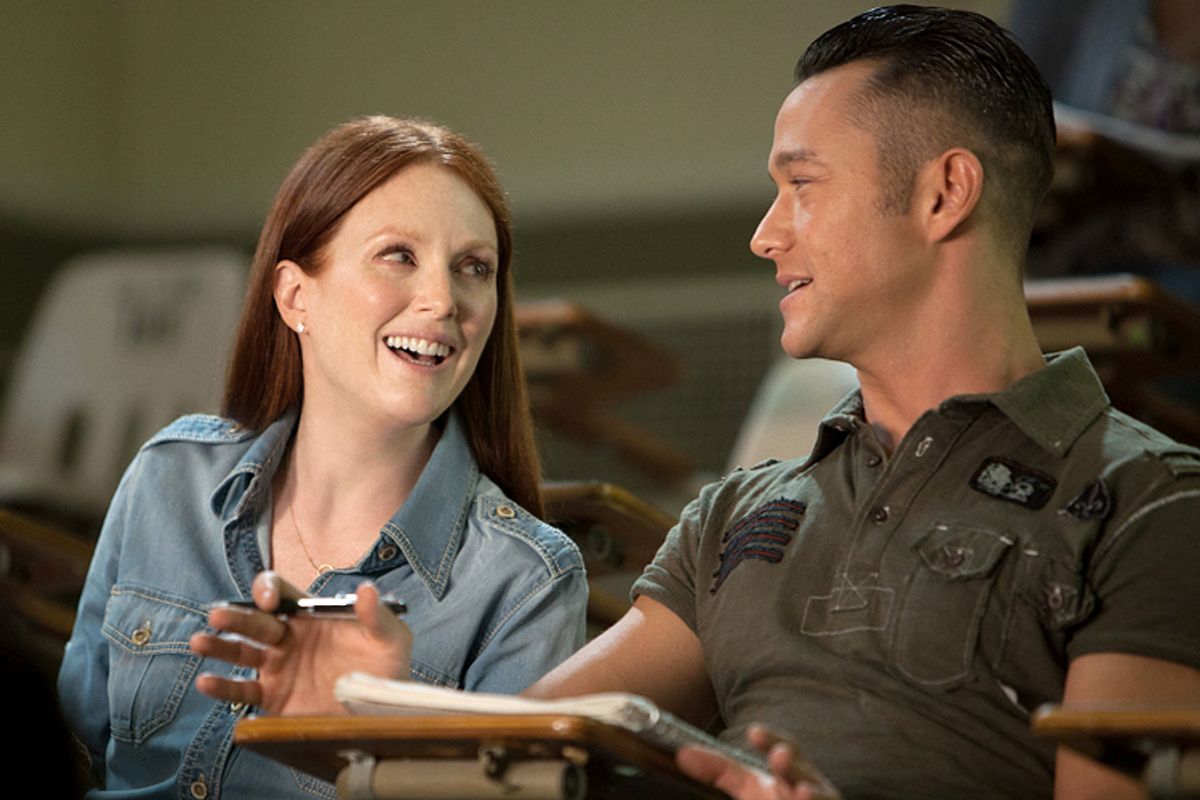"Don Jon" does a lot of things well. It tackles a heady, uncomfortable topic with a stroke of undeniable humor. It smears the lascivious, sexist corners of American culture while never getting too preachy. It’s perhaps the first mainstream movie to feature a heavy dose of pornography, going so far as to call out video-aggregator PornHub by name. And it’s also a charming, genuinely affecting love story, populated with memorable characters and honest flaws. Even if you, like me, aren’t particularly concerned with the ethics of the porn industry, it does force you to consider the persistent effects of heavy sexual content on someone who can’t ever look away. Jon likes his porn -- he likes it even better than sex -- and the movie is essentially about his slow realization that he may have things backward.
But therein lies the problem with "Don Jon." Jon finds the cure for his porn addiction through surprisingly conservative means. He meets an older woman (Esther, played by Julianne Moore) who takes him in as a sort of cross between a mother and a lover. It’s with Esther that Jon learns the “right way” to have sex. A very quiet, sensual, emotionally intimate sex scene serves as the climax (ha) of the film. It’s only after spending the night engaged in a very sincere sort of lovemaking that Jon understands exactly what he’s been missing.
That isn’t necessarily a problem. Jon spends the film having unfulfilling sex with a lot of disappointed women, and he certainly does need to rethink his philosophies about intimacy. Esther shows him what it’s like to have great sex, with both parties fully present, and this lesson is smartly set against the grabby, half-drunk hookups that have Jon crawling to his porn collection after the deed. But "Don Jon" doesn’t show us any other options.
For a film that’s very open-minded in its themes, it seems weirdly intolerant to imply that there are right ways and wrong ways to make love. "Don Jon’s" conclusion essentially says you can only truly enjoy sex if you’re treating it like a holy communion. There’s no aggression, or submission, or even a whisper of playfulness. We’re told to stare into each other’s eyes, take a deep breath, and have the kind of sex that won’t scare our parents. It’s presented as a revolution, Jon abandoning his cocksure selfishness and finally revealing his previous innocence and vulnerability, but it can’t help coming off as traditional, even regressive.
I’m not saying I’d rather have "Don Jon" end with a montage of Joseph Gordon-Levitt and Julianne Moore trying every position in the book, nor am I saying that I think the movie shames people with more unconventional tastes in intimacy. But I do think it’s strange that the film would end by giving us a definitive answer on something as complicated and various as sex.
While it makes sense that Jon’s story would conclude with him having a different kind of sex with a different kind of woman, the film remains fairly confident that its message applies to society at large. It blasts us with cheaply produced porn and skimpy, overtly sexualized commercials. It looks down on the grimy men and women who live and die through random weekend romances. Are those real issues? Sure, but "Don Jon" is adamant that the quiet, ruminative sex scene with Esther is the cure for all of those ills. Esther shows him the anointed, "correct" type of intimacy, and Jon's porn addiction immediately melts away. One kind of sex, one kind of attitude, to achieve one kind of purity. "Don Jon" tells us over and over that true pleasure comes when you lose yourself in someone, but its definition of “losing yourself” is discouragingly narrow.



Shares